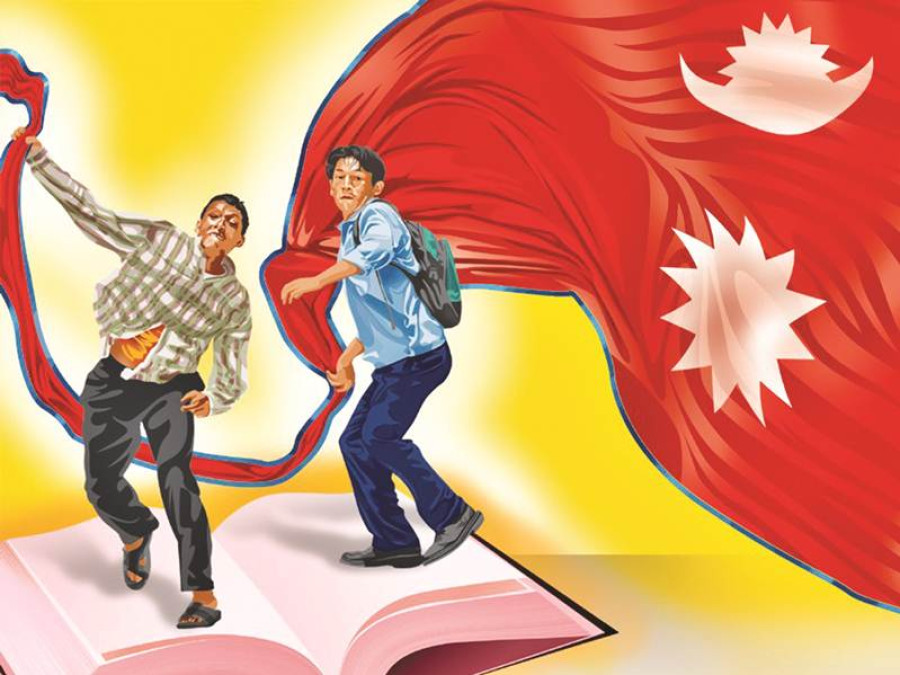Opinion
Missing roadmap
Kathmandu is still not listening to protestors even after they have changed their extreme form of protest
Dipendra Jha
At a time when the country is facing huge challenges in implementing the new constitution and accelerating the pace of reconstruction, the major political parties—the Nepali Congress, the CPN-UML and the CPN (Maoist Centre)—seem to be busy with political infighting.
Existing hurdles
As far as the implementation of the new constitution is concerned, the government needs to hold three elections—parliamentary, provincial, and local—in the next 18 months and Parliament will have to enact dozens of laws for the elections to take place. If the government fails to hold the three elections in 18 months, the new constitution will fail. This will be the biggest failure of the government, which will push the country towards a constitutional crisis.
As it is imperative to hold the elections, the political parties should work on it rather than trying to clinch a power-sharing deal among themselves. The CPN (Maoist Centre), which can a play vital role in bringing all sides to the negotiating table, seems to be mainly concerned about conflict-era cases.
The government has made it clear it wants to conduct the elections, starting with the local polls first, but it has not prepared the necessary legal and other frameworks. More importantly, the government is not making sincere efforts to resolve the political issues raised by the Madhesi and Janajati forces. Can the government hold local polls without the consent of the agitating Madhesi forces?
Meanwhile, the government will also have to constitute multiple bodies to cater to the needs of the citizens in a federal set-up. However, in the face of the agitation launched by the Madhesi, Tharu and Janajati forces, implementing the new constitution remains a challenge.
Moreover, attaining the proposed federal set-up will be a complicated task. The government does not seem serious about a federal structure. For instance, the constitution states that high courts will be constituted within one year of the constitution’s promulgation, which means that the government now has only three months to form them. The government’s lack of interest in implementing the federal structure raises serious concerns. How can we expect proper implementation of federalism when the prime minister and a few deputy prime ministers speak loudly and publically against it?
The agitating forces
Whether Prime Minister KP Sharma Oli remains at the helm of affairs, or the CPN (Maoist Centre) Chair Pushpa Kamal Dahal or the Nepali Congress President Sher Bahadur Deuba becomes the new prime minister, there will not be a substantial change unless the major parties address the demands of the agitating forces. They are fighting for power instead of making efforts to address the serious challenges the country is facing due to the disaffection among various groups that have genuine grievances against some of the provisions in the new constitution.
The Madhesis, Tharus and Janajatis have been staging a relay hunger strike in Kathmandu for more than a month now. Yet Kathmandu, which complained during the Madhes movement that the agitating forces were unnecessarily punishing them by causing obstruction in the supply of essential goods, has not been sympathetic to the protestors now that they have changed their extreme form of protest. Even the international community, which kept pressurising the agitating forces to employ milder forms of protests to press for their agenda, is now maintaining a mysterious silence over the issues raised by the marginalised forces. The Madhesi leaders have warned that if they have to return to the Madhes empty-handed, they would resort to extreme forms of protest. The government and the major parties should not take this warning lightly.
Listen to them
The state that repeatedly criticised the agitating Madhesi forces during the Madhes movement for not turning their extreme form of protest into milder forms is still taking the agitating forces as a warring faction. Although the agitating forces have adopted milder methods of protest to draw the attention of the government and other stakeholders to their agendas, the state has not addressed any of their demands. For example, the government has not withdrawn the cases against Madhesi cadres and leaders. It has not borne the cost of treatment for those injured during the recent Madhes movement. And it does not seem willing to declare those who lost their lives during the protests as martyrs.
The state has not formed any probe commission to investigate the killings that took place during the Madhes movement. The Appellate Court Janakpur has recently told the District Administration Office, Mahottari and District Police Office, Mahottari to accept an FIR by Nitu Yadav who wants to lodge a case against the killing of his son Rambibek Yadav. It is the state’s duty to probe such incidents. Delay in forming a high level probe commission cannot be justified on any grounds. Now the government is trying to register new draft laws in Parliament to facilitate the implementation of the constitution. The new constitution has reduced the Madhesi, Tharu, Muslim and Janajati commissions to merely an advisory role and the government’s draft bill on these commissions also proposes to place them under the ambit of the Local Development Ministry. Draft bills of Supreme Court Act and Judicial Administration Act do not reflect the true spirit of inclusion.
The government must wake up to the new realities and try to respond to the demands of agitating forces rather than pushing them to a corner. The major parties should not be carried away just because they won a large number of seats from the Madhes in the last election. The scenario might change a lot in the next general election if they do not respect the Madhesi voices. The major parties should know that the Madhesi and Tharus are frustrated with them for their failure to address their constitutional grievances and the way their people were killed during the protests. The international community should also persuade Nepali stakeholders to find a negotiated settlement of the constitutional issues before the agitating forces resort to extreme forms of protests again and make public their position to boycott the local elections.
Jha is a practicing lawyer at Supreme Court




 17.9°C Kathmandu
17.9°C Kathmandu











